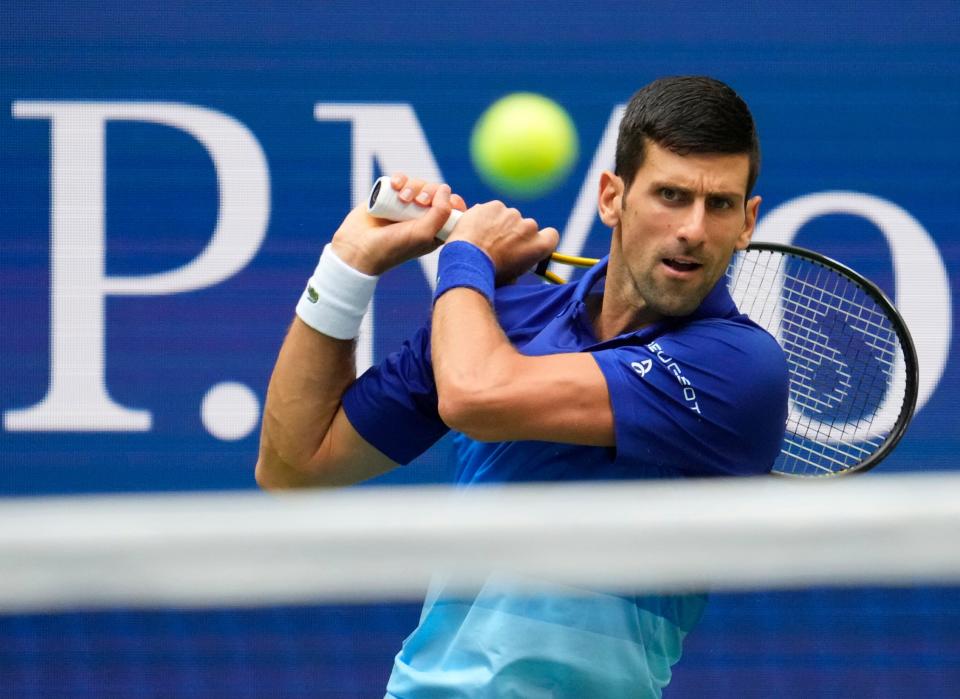Novak Djokovic claims he had COVID-19 last month and met the requirements to travel to Australia
The Novak Djokovic saga only got more intriguing after the release of court documents Saturday while he remains detained in Australia.
Djokovic, whose visa was cancelled by the federal government because he purportedly didn't meet requirements to enter the country without being vaccinated against COVID-19, will have his appeal heard Monday in a Melbourne court in a last-ditch effort to play in the Australian Open.
In that appeal, Djokovic will argue that he received a letter of clearance from the Department of Home Affairs on Jan. 1 allowing him to travel to Australia without quarantine “where permitted by the jurisdiction of (his) arrival.”
Combined with the certificate Djokovic received from the state of Victoria and Tennis Australia on Dec. 30, granting him an exemption from the vaccination requirements, Djokovic “understood that he was entitled to enter Australia and Victoria and to compete in the Australian Tennis Open,” according to the documents.

Since the decision to deny Djokovic entry at the border earlier in the week, the federal government, the state government and Tennis Australia have been pointing fingers at each other about how the world’s No. 1-ranked tennis player ended in the middle of a political morass.
OPINION: Even for Djokovic, this Aussie Open debacle is embarrassing
MORE: Nadal short on sympathy for Djokovic: 'He knew the conditions'
The government has released correspondence with tournament officials from November stating its position that a COVID-19 infection within the past six months wasn't sufficient grounds to enter the country without being vaccinated. Australian Open officials have pushed back and pointed to contradictory information on various government Web sites.
Meanwhile, Djokovic’s claim that he tested positive for COVID-19 on Dec. 16 as grounds for the exemption could face scrutiny on two fronts. According to reports from The Age in Melbourne and the Sydney Morning Herald, a document from the tournament stated that the application for exemption was due on Dec. 10, at which point Djokovic hadn’t yet tested positive.
Also, there are multiple social media and press accounts of Djokovic making public appearances on and around Dec. 16, including a photo he posted on social media of attending a Dec. 17 ceremony in which he was honored by Serbian government officials with a commemorative postage stamp. He was also photographed at a basketball game on Dec. 14.
It’s unclear from the documents exactly whether Djokovic’s positive test was merely received on Dec. 16 or whether that’s the date the sample was taken.
Either way, his lawyers will state that Djokovic did not receive due process at the border and that the interrogation that led to his visa being canceled was rife with procedural errors and contradictory information about access to legal representation.
Djokovic’s attorneys argue in the documents there’s a “complete disproportion between the serious consequences of cancellation ... compared with the miniscule or non-existent risk to health he posed if permitted to Australia.”
Djokovic could face up to a three-year ban from entering Australia if his visa is canceled and he’s forced to leave the country.
Since his detainment at the border, the nine-time Australian Open champion has been contained a quarantine facility in Melbourne and has been denied a request to move into the housing his team had rented for the tournament or the ability to practice.
He’s seeking to win his 21st Grand Slam title, which would break the current tie for the all-time lead with Roger Federer and Rafael Nadal.
This article originally appeared on USA TODAY: Novak Djokovic claims he had COVID-19 last month and met requirements

